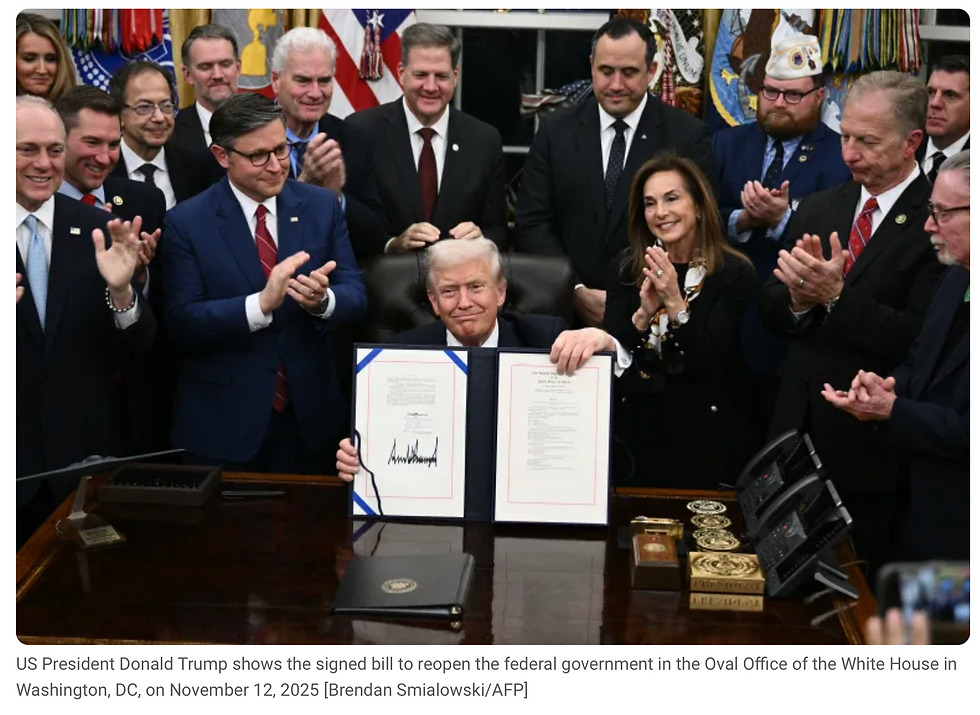What Matters this Week: Jan 27-31, 2020
- tim@emorningcoffee.com

- Jan 27, 2020
- 4 min read
Updated: Jul 19, 2020
The World Economic Forum in Davos came and went last week. The overall mood was reported to be generally downbeat as many of the global themes were less than encouraging, including actions (or lack thereof) on global climate change, as well as concerns about negative interest rates and weak economic growth particularly in the Eurozone and Japan. Most of the positive vibe seemed to come from President Trump, who lauded the U.S. “economic success story” (see post from last week), from other U.S. officials from the Administration, and from a number of high profile U.S. business leaders. The New York Times covered both the economic conclusions (see this link) and the issue of climate change (see this link) in its summary of Davos.
The global equity markets were flat to slightly down overall last week. The S&P 500 (below) closed down 0.8% (WoW) after a big earnings week, mixed discussions at Davos,

and growing concerns about the Coronavirus situation in China. The FTSE 100 and the Nikkei 225 both also closed slightly lower on the week (both down 1.1%, FTSE at 7,585.98, Nikkei 225 at 23,816.31), and the STOXX Europe 600 was about flat on the week (close 423.64).
As far as 4Q earnings last week, the results were about on trend overall. Around two-thirds of the 85 S&P 500 companies that have reported so far have beat expectations, which is more or less in line with the historical “over/under”. This report - entitled “This Week in Earnings” from Refinitiv - provides an excellent summary of where we stand as far as 4Q U.S. earnings to date. Energy continues to be the sector that is dragging down both revenue growth and earnings growth of U.S. companies that have reported. Several of the largest U.S. banks reported earnings last week, and most were very good, with J.P Morgan leading the pack. Netflix released 4Q earnings mid-week, and after an initial sell-off of 2% (to around $325/share), the stock rallied to recover ending the week higher at $353/share. (As an aside, I am working on a post on the streaming companies now.)
There are 473 U.S. companies that will report earnings this week, of which 141 are S&P 500 companies. Earnings versus consensus expectations will therefore be influential in a market that is beginning to feel slightly fragile. Some of the larger cap bell-weather names reporting this week, amongst others, include:
Monday: Sprint (3Q), PerkinElmer and D.R. Horton;
Tuesday: Apple, LVHM, Starbucks, AMD and HCA;
Wednesday: Mastercard, Microsoft, Facebook, AT&T, Boeing, McDonald’s, GE, Tesla and AMD;
Thursday: Amazon, Coca-Cola, Shell, Samsung, Eli Lily, Verizon, Christian Dior, Unilever; and
Friday: ExxonMobile, Chevron, Honeywell, Caterpillar, Colgate, Honda, Philips and Weyerhauser.
As far as two heavily shorted stocks reporting this week, Tesla continued its one-way (in my opinion short-covering-fuelled) ascendancy from a touch over $507 at the beginning of last week to close at over $564 on Friday. Mid-week, the stock touched a high of almost $593! Tesla releases its earnings on Wednesday (Jan 29th) after the market closes, and the consensus estimate for 4Q2019 earnings is $0.57/share (source: Zacks Investment Research). Apple, a different animal all together but also a heavily shorted stock, closed last week up another $2/share WoW, at $318.31. Consensus 4Q earnings are $4.53/share (source: Zacks Investment Research). I am not going to drift into the differences in quality between Tesla and Apple (and they are material to say the least), but suffice it to say that even though shorts are betting against both stocks at these levels, their influence in Tesla is significantly higher because around 20% of its shares are held short versus only around 1% for Apple. One more thing – if you want to follow short positions in stocks, ShortSqueeze.com seems to be a good site. [DISCLAIMER: I do not own TSLA shares but have owned shares in the past. I do currently own AAPL shares.]
The world is closely watching the Coronavirus that originated in Wuhan, China, dampening Chinese New Year celebrations (running from January 25th to February 4th) to kick off 2020 - The Year of the Rat. The BBC reported this morning (Jan 27th) that - so far - there have been over 3,000 cases of the Coronavirus reported and 81 deaths, and the number seems to be growing by the minute. This is a horrible health issue for humanity needless to say, and hopefully it will be contained soon. Could this also be a “black swan” event that derails global economic growth, dragging the equity markets down with it?
The on-going saga involving Harry and Meghan, the Duke and Duchess of Sussex, continues to grab headlines. Both “The Daily” (podcast from the New York Times – see here) and The Economist provided stories on the (ex?)-Royals late last week. I thought the article in The Economist (British edition, January 25th) entitled “The remarkable similarities between Queen Elizabeth and Alex Ferguson: Two innovative managers who are willing to take tough decisions” was particularly good, as it compared “the management” at The House of Windsor to Sir Alex Ferguson’s 27-year reign at Manchester United. The opening quote from the article probably says it all: “The parallels between a royal family and a football squad are not exact—footballers tend to be more disciplined and better trained than royals—but monarchs and football managers are both in charge of small groups of unusual individuals who are constantly in the public eye.”













Bravo, Tim! Thank you!